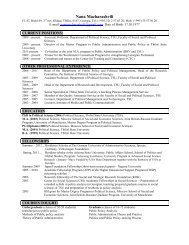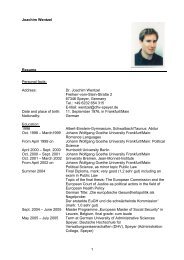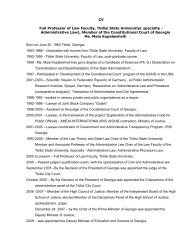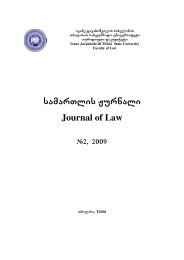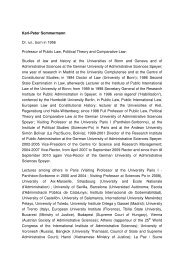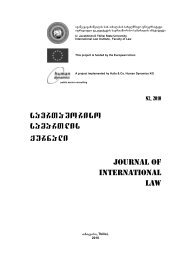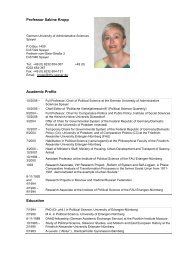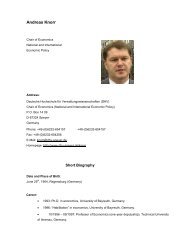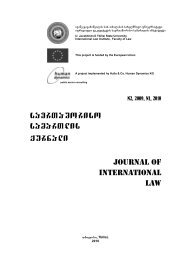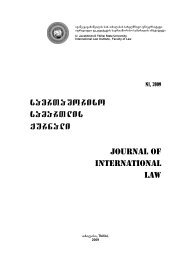Untitled
Untitled
Untitled
You also want an ePaper? Increase the reach of your titles
YUMPU automatically turns print PDFs into web optimized ePapers that Google loves.
I. KURDADZE, STAGES OF DEVELOPMENT OF SCIENTIFIC CONCEPTS ON CORRELATION BETWEEN ...<br />
or will of a state. This absolutely does not<br />
mean that international law is unalterable. The<br />
universally recognized norms of international<br />
law used to be created and still are created<br />
based on the agreement of the will of states,<br />
their alteration or annulment is possible also<br />
based on the agreement and not on the basis<br />
of the will of one state. However, the newly<br />
emerged states cannot change the already<br />
existing system, which means that a state complies<br />
with the already settled order that indicates<br />
at the primacy of international law. This<br />
does not mean that separate states do not<br />
violate international legal norms however this<br />
does not certainly justify the nihilist theories<br />
in the field of international law.<br />
Due to this the majority of the authors was<br />
actively promoting the obligatory character of<br />
international law and was proving this through<br />
the examples of the practice. It should be remembered<br />
that there were numerous authors<br />
at that time recognizing the objective existence<br />
of international law and standing of certain<br />
norms above the will of separate states. 8<br />
After the First World War the second direction<br />
of the monist theory starts emerging –<br />
the primacy of international law over the domestic<br />
law.<br />
H. Kelsen categorically denied any relation<br />
of the natural law with the positive law. It considered<br />
law as the closed hierarchy of norms. All<br />
the legal norms within this normative system represent<br />
one unity. All these norms, among them<br />
international legal norms, regulate the relations<br />
between the individuals. If international law binds<br />
and authorizes state, this does not mean that it<br />
does not bind and authorize individuals; this<br />
means that international law binds and grants<br />
authority to individuals who represent state bodies.<br />
This rule of conduct is established by international<br />
law not directly, but through the national<br />
legal order. The latter defines the circle of<br />
persons which implement international law in<br />
domestic bodies. In this respect the international<br />
legal order delegates the implementation<br />
of its norms to domestic law. According to<br />
H. Kelsen in this uniform system of law international<br />
law stands higher than domestic law.<br />
Certainly international law defines the material<br />
content of domestic law. It is the basis of<br />
domestic law (among them are the constitutional<br />
norms). The international legal order<br />
shows its importance only as a part of universal<br />
legal order. 9<br />
In “The Principles of International Law”<br />
Kelsen argues that international law is the<br />
supreme legal order, limitation of which is not<br />
allowed, it limits national legal order itself. Limiting<br />
the functioning of national legal order is<br />
important function of the international legal<br />
order. As per important characteristic of domestic<br />
legal order the author considers the<br />
circumstance that domestic legal order obeys<br />
only international legal order.<br />
The object of all he legal norms of the universal<br />
legal system created by H. Kelsen is the<br />
action of an individual. If the domestic legal norm<br />
directly regulates actis of an individual, international<br />
norm regulates them through the domestic<br />
legal order. It is the domestic legal order which<br />
identifies which officials or the state bodies can<br />
make these norms work. Therefore, in Kelsen’s<br />
view, international law defines the “material<br />
element” of the operation of the international<br />
legal norm, whereas the domestic law defines<br />
the “personal element”. From this viewpoint<br />
the norms of international law do not require<br />
“transformation”, if this is not specifically envisaged<br />
by the international legal norm itself.<br />
The norm is transmitted directly and is based<br />
on the “delegation” of international law with<br />
regard to domestic law. This is not transformation,<br />
but a phase of the procedure of creation<br />
of law, the form of which is uniform. 10<br />
Therefore, Kelsen rejects the dualistic<br />
theory, which, according to his position, derives<br />
from the dogma of sovereignty, according<br />
to which “international law creates rights<br />
and obligations for states only and not for its<br />
organs and citizens». With this Kelsen going<br />
against the dualistic approach, states that international<br />
law together with the domestic law<br />
creates uniform system and represents the<br />
universal system of law.<br />
The Kelsen Theory on the pyramid hierarchy<br />
of legal norms, the unity of international<br />
and domestic legal systems was recognized<br />
as the classical model of the monistic theory<br />
of primacy of international law, however it had<br />
not many supporters.<br />
The monistic theory is shared not only by<br />
positivists, but by solidarists as well, if H. Kelsen<br />
does not go at the end of the hierarchy beyond<br />
the legality of the supreme norm and places the<br />
search for the basis of the “main norm”<br />
(Grundnorm) outside the scope of the construction<br />
of normativism, solidarists “enlist the objective<br />
events” outside the positive law to the basis<br />
23



